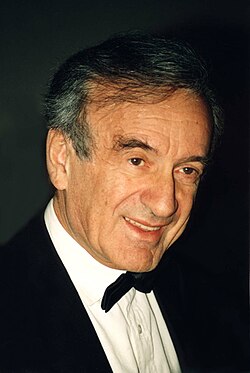Elie Wiesel Quote
Then came the march past the victims. The two men were no longer alive. Their tongues were hanging out, swollen and bluish. But the third rope was still moving: the child, too light, was still breathing...And so he remained for more than half an hour, lingering between life and death, writhing before our eyes.And we were forced to look at him at close range. He was still alive when I passed him. His tongue was still red, his eyes not yet extinguished.Behind me, I heard the same man asking:For God's sake, where is God?And from within me, I heard a voice answer:Where He is? This is where--hanging here from this gallows...That night, the soup tasted of corpses.
Then came the march past the victims. The two men were no longer alive. Their tongues were hanging out, swollen and bluish. But the third rope was still moving: the child, too light, was still breathing...And so he remained for more than half an hour, lingering between life and death, writhing before our eyes.And we were forced to look at him at close range. He was still alive when I passed him. His tongue was still red, his eyes not yet extinguished.Behind me, I heard the same man asking:For God's sake, where is God?And from within me, I heard a voice answer:Where He is? This is where--hanging here from this gallows...That night, the soup tasted of corpses.
Related Quotes
About Elie Wiesel
As a political activist, Wiesel became a regular speaker on the subject of the Holocaust and remained a strong defender of human rights during his lifetime, advocating for justice in numerous causes around the globe, including that of Soviet Jews and Ethiopian Jews, South African apartheid, the Rwandan genocide, the Bosnian genocide, the War in Darfur, the Kurdish independence movement, the Armenian genocide, Argentina's Desaparecidos, Nicaragua's Miskito people, the Sri Lankan Tamils, and the Cambodian genocide. He was also an outspoken advocate for Israel and frequently weighed in to support the country during escalations of the Arab–Israeli conflict and throughout the Iran–Israel proxy conflict, while also hosting direct talks to facilitate the Israeli–Palestinian peace process.
Wiesel was a professor of the humanities at Boston University, which created the Elie Wiesel Center for Jewish Studies in his honor. He received a number of awards, including the Nobel Peace Prize in 1986. He was a founding board member of the Human Rights Foundation and remained active in it throughout his life. Wiesel was one of the main figures who spearheaded the establishment of the United States Holocaust Memorial Museum in 1993.
